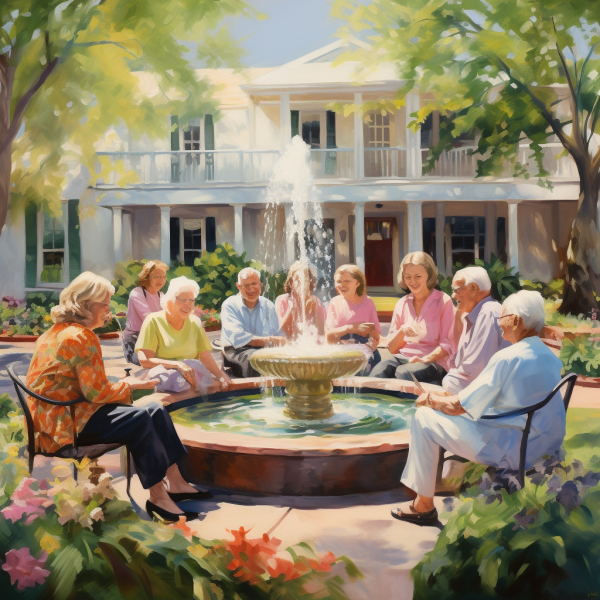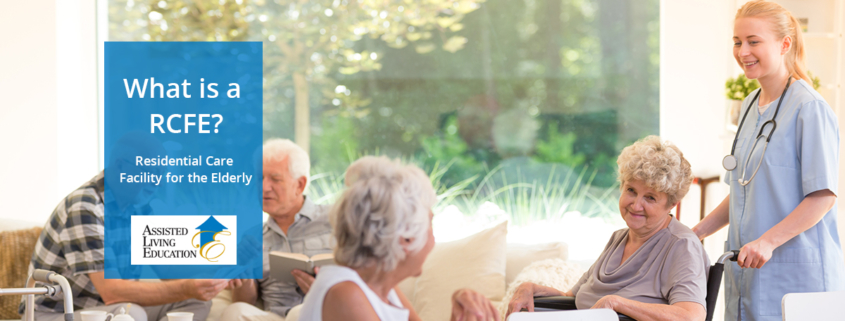What Is a RCFE (Residential Care Facility for the Elderly)?
California is unique in many ways. We have the best weather in the entire country, we are cultural trendsetters, and California leads the industry with the residential care facilities for the elderly (RCFEs) model.
You may wonder what RCFEs are and how they differ from other senior housing models.
We will answer that question and more in this article.
Defining an RCFE Facility
RCFEs, have many different names such as Care Homes, board and care, retirement homes and Assisted Living Continuing Care Retirement Communities (CCRCs) include independent living, assisted living and Memory Care and sometimes a skilled nursing facility. All RCFE’s provide care to seniors who are age 60 and older. Aside from housing, RCFEs deliver care to senior residents along with assistance with activities of daily living, meals, activities, and general supervision as needed.
Facilities provide a resident driven careplan that incorporates the resident’s physical needs as well as resident choices in regards to meals, activities and care.

A quality RCFE provides seniors with a congenial place to meet and socialize in a friendly, peaceful setting.
How Is the RCFE Environment?
A good Residential Care Facility has an atmosphere that is warm and inviting, just like home, and promotes maximum possible independence and dignity. RCFEs encourage the involvement and support of family and community members to maintain or improve the quality of life for their residents. Residents have access to a host of supportive services, such as housekeeping, personal care, dressing, bathing, and the safekeeping and distribution of medications to its residents for self-administration.
One of the benefits of an RCFE is that it acts as an intermediary between independent living and 24-hour nursing care. RCFEs can act as a bridge for the person who is no longer able to live independently but does not require round-the-clock assistance and supervision.
They are not medical facilities, which means they don’t necessarily have nurses or doctors on staff (or at least there’s no requirement to have them staffed). Think of them more as assisted living and less as nursing homes.
RCFEs provide safe and healthy living accommodations and services. Some of the ancillary services include but are not limited to:
- Consistent monitoring of the resident’s mental and physical state of being
- Regular, healthy meals and snacks with diet modifications
- Recreational activities and social engagement in a fun environment
- Transportation and outings
Comparatively, Skilled Nursing Facilities provide 24/7 skilled professional medical services. This includes more specialized care that can only be treated by qualified, credentialed health care workers. Skilled Nursing Facilities are medical facilities as opposed to a housing option that includes services.
Read more about what a day in the life of an RCFE administrator is really like.
What Regulations Are in Place for RCFEs?
RCFEs are designed to promote independence and self-direction to the greatest extent possible in a residential setting. An RCFE license is issued by the Department of Social Services in California. They are governed by robust regulations and must meet quality, care, and safety standards as defined by the State. They also require an inspection by the Department of Social Services and the local Fire Inspector.
To open and operate an RCFE, one must submit a license application to the Community Care Licensing Division. Applicants must provide evidence that demonstrates they are of upstanding, reputable, and responsible character in addition to all the other application requirements with which they must comply. Additional items in the application include medication policies and procedures, sample menus, how and when their staff will be trained and a sample budget. Assisted Living Education can prepare your RCFE license application for you. We also offer RCFE classes and RCFE continuing education.
Should I Be Concerned About Covid-19 and RCFEs?
Many of the deaths that have occurred in the U.S. due to Covid-19 have occurred in the elderly population and nursing homes are a part of that equation. Like hospitals, Skilled Nursing Facilities are medical environments where viruses and other illnesses can spread, especially among the elderly. RCFEs are not medical facilities and have not experienced the outbreak of SARS-CoV-2 to the extent that medical facilities have. Still, it is always important for the elderly and those with underlying health issues to take every precaution necessary to protect against the virus. A well-run RCFE that has opened properly will have the right protocols in place to protect both the residents and themselves to the greatest extent possible.
Even now, as the most serious days of Covid-19 and its many mutations are hopefully behind us and trending down, every good assisted living administrator and staff must always be on guard against the spread of any infectious disease.
Hopefully, this answers some of the questions you have about RCFEs. If you are worried about sending a loved one to this type of facility, don’t worry. They are a great first and gradual step back from full independent living with qualified staff that will serve your loved one well.
People Also Ask:
How do I get my RCFE certificate?
Items needed to become an RCFE administrator: You must be at least 21, completed high school or obtained a GED, completed the 80-hour RCFE Certification class, pass the state exam, pass a background check and pay the state fee for the RCFE certification application.
What is a residential care facility for the elderly (RCFE)?
An RCFE, also known as an assisted living facility or board and care home, is a residential setting that provides housing, meals, and assistance with daily living activities for older adults who need some help but don’t require the level of care provided by a nursing home. RCFEs are typically smaller and more home-like than nursing homes, with a focus on maintaining independence and fostering a sense of community.
Who are RCFEs for?
RCFEs are a good option for seniors who:
- Need help with activities of daily living (ADLs) such as bathing, dressing, eating, and toileting.
- Can walk with assistance or use a mobility device.
- Are not cognitively impaired or have only mild cognitive impairment.
- Do not require 24-hour skilled nursing care.
What services do RCFEs provide?
RCFEs provide a variety of services, including:
- Housing: Private or semi-private rooms, furnished or unfurnished.
- Meals: Three meals a day, plus snacks.
- Assistance with ADLs: Bathing, dressing, eating, toileting, transferring, and medication management.
- Housekeeping: Laundry, light cleaning, and trash removal.
- Social and recreational activities: Games, outings, exercise classes, and entertainment.
- Transportation: Assistance with errands and appointments.
- Security: Staff is on-site 24 hours a day, and there are often emergency call systems in place.
What are the costs of living in an RCFE?
The cost of living in an RCFE varies depending on the location, size, and level of care provided. The average monthly cost is around $4,000, but it can range from $2,000 to $6,000 or more. Some RCFEs offer discounts for veterans or Medicaid recipients.
How do I choose the right RCFE?
When choosing an RCFE, it is important to consider your needs and preferences, as well as the needs and preferences of your loved one. Here are some things to keep in mind:
- Location: Is the RCFE close to family and friends? Is it in a safe and convenient neighborhood?
- Size and atmosphere: Do you prefer a small, home-like setting or a larger community?
- Services offered: Does the RCFE offer the services you need, such as assistance with ADLs, medication management, and transportation?
- Cost: Does the RCFE fit your budget?
- Staff: Are the staff members qualified and experienced? Do they seem caring and compassionate?
- Activities and amenities: Does the RCFE offer activities and amenities that you enjoy?
Can I visit an RCFE before I move in?
Yes, you are encouraged to visit an RCFE before you move in. This will give you a chance to see the facility, meet the staff, and ask questions.



